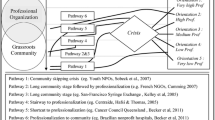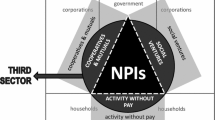Abstract
The present paper discusses the response of the Austrian and Slovak nonprofits to the recent migration crisis. In both countries, nonprofits delivered crucial problem-solving contributions but faced serious challenges related to scaling up, capacity building, and improving coordination. Drawing on the Luhmannian systems-theoretic approach, the paper argues that these challenges gave a boost to the systemic identity of nonprofits. Triggered by the substantial inflows of public money, the systemic identity explains why nonprofits can successfully operate in the polarized societal environment and develop unique expertise which is valuable to the public sector. At the same time, the systemic identity lowers the responsiveness of nonprofits to the societal environment. The major policy implication is that this responsiveness has to be continually improved through rational discourses and stakeholder dialogues.
Similar content being viewed by others
Notes
Source: http://ec.europa.eu/eurostat/documents/2995521/7203832/3-04032016-AP-EN.pdf/790eba01-381c-4163-bcd2-a54959b99ed6 (accessed 11.9.2016)
Source: http://www.minv.sk/?statistiky-20 (accessed 14.9.2016)
Source: http://dennik.hnonline.sk/slovensko/544357-slovensko-prijalo-149-utecencov-v-iraku-sa-uz-ucili-po-slovensky (accessed 14.9.2016)
Source: http://spravy.pravda.sk/domace/clanok/371415-vlada-schvalila-pomoc-mimovladkam-kvoli-uteceneckej-krize/ (accessed 11.9.2016)
These financial resources are managed by the Open Society Foundation. Decision on specific grants to NGOs are made by the Council composed of representatives of the “Plea for Humanity” petition, independent experts and representatives of the TIPOS company acting as observers.
Source: http://www.teraz.sk/slovensko/organizacie-pomoc-utecencom/172805-clanok.html (accessed 11.9.2016)
Source: https://www.linkedin.com/company/od-em%C3%B3ci%C3%AD-k-poznaniu---eduma-n.o. (accessed 14.9.2016)
References
Bauer R (1997) Zivilgesellschaftliche Gestaltung in der Bundesrepublik. In: Schmahls K, Heinelt H (eds) Möglichkeiten oder Grenzen? Skeptische Anmerkungen aus Sicht der Nonprofit-Forschung. Zivile Gesellschaft, Opladen, pp 133–153
Beck U (2000) Risk society revisited: theory, politics, and research programs. In: Adam B, Beck U, Loon J (eds) The risk society and beyond: critical issues for social theory. Sage, London, pp 211–229
Carella M, Gurrieri AR, Lorizio M (2007) The role of non-profit organisations in migration policies: Spain and Italy compared. J Socio-Econ 36:914–931
Chowdhury R (2015) Using interactive planning to create a child protection framework in an NGO setting. Syst Pract Action Res 28(6):547–574
Douglas J (2001) The political theories of nonprofit organizations. In: Ott JS (ed) The nature of the nonprofit sector. Westview Press, Boulder, pp 205–216
Ferreira S (2014) Sociological observations of the third sector through systems theory: an analytical proposal. Voluntas 25(6):1671–1693
Gordenker L, Weiss TG (1995) NGO participation in the international policy process. Third World Q 16(3):543–555
Gubrium JF, Holstein JA (eds) (2002) Handbook of interview research: context and method. Sage, Thousand Oaks
Habermas J (1985) The theory of communicative action. Volume 2: lifeworld and system: a critique of functionalist reason. Beacon Press, Boston
Jordan N (1972) Themes in speculative psychology. Tavistock Publications, London
Kazakov R, Kunc M (2016) Foreseeing the dynamics of strategy: an anticipatory systems perspective. Syst Pract Action Res 29(1):1–25
Kvale S (2003) The psychoanalytic interview as inspiration for qualitative research. In: Camic PM, Rhodes JE, Yardley L (eds) Qualitative research in psychology. American Psychological Association, Washington, DC, pp 275–297
Luhmann N (1989) Ecological Communication. The University of Chicago Press, Chicago
Luhmann N (1995) Social systems. Stanford University Press, Stanford
Luhmann N (2012) Theory of society, volume 1. Stanford University Press, Stanford
Mason DP, Fiocco E (2016) Crisis on the border: specialized capacity building in nonprofit immigration organizations. Voluntas. doi:10.1007/s11266-016-9754-8
Nič M, Sturm C (2016) Solidarity with refugees is not exclusively reserved for the west. In social Europe. Internet. https://www.socialeurope.eu/2016/05/solidarity-refugees-not-exclusively-reserved-west/. Accessed sept 27 2016
Roth S (2015) Free economy! On 3628800 alternatives of and to capitalism. J Interdiscip Econ 27(2):107–128
Roth S, Schütz A (2015) Ten systems. Toward a canon of function systems. Cybern Hum Knowing 22(4):11–31
Schostak J (2006) The interview in the project context. In Interviewing and representation in qualitative research. Open University Press, New York, pp 9–25
Seibel W (1992) Funktionaler Dilettantismus. Erfolgreich scheiternde Organisationen im “Dritten Sektor” zwischen Markt und Staat. Baden-Baden
Seibel W (1996) Successful failure. An alternative view of organizational coping. Am Behav Sci 39(8):1011–1024
Simsa R et al. (2016) Beiträge der Zivilgesellschaft zur Bewältigung der Flüchtlingskrise–Leistungen und Lernchancen. Wien: NPO & SE Kompetenzzentrum.
Steinberg R (2006) Economic theories of nonprofit organization. In: Powell W, Steinberg R (eds) The nonprofit sector: a research handbook. Yale University Press, New Haven, pp 117–139
Svidroňová M (2013) Sustainability strategy of non-government organisations in Slovakia. E+M Ekonomie a management 16(3):85–100
Thompson S, Valentinov V (2017) The neglect of society in the theory of the firm: a systems theory perspective. Camb J Econ. doi:10.1093/cje/bew072
Vaceková G (2016) Metodologické okienko: Kódovanie v textovej analýze – computer assisted qualitative data analysis software (MAXQDA). Public policy news. Odborná príloha 3(3):1–3
Vaceková G, Bolečeková M (2015) Social entrepreneurship in the Czech Republic in the light of European migrant crisis. Littera Scripta 8(2):136–149
Vacekova G, Valentinov V, Nemec J (2016) Rethinking nonprofit commercialization: the case of the Czech Republic. Voluntas. doi:10.1007/s11266-016-9772-6
Valentinov V (2014) The complexity-sustainability trade-off in Niklas Luhmann’s social systems theory. Syst Res Behav Sci 31(1):14–22
Valentinov V (2017a) The ethics of functional differentiation: Reclaiming morality in Niklas Luhmann's systems theory. Journal of Business Ethics. doi:10.1007/s10551-017-3521-7
Valentinov V (2017b) Wiener and Luhmann on feedback: from complexity to sustainability. Kybernetes 46(3):433–449
Valentinov V, Chatalova L (2016) Institutional economics and social dilemmas: a systems theory perspective. Sys Res and Behav Sci. 33(1):138–149
Valentinov V, Hielscher S, Pies I (2013) The meaning of nonprofit advocacy: an ordonomic perspective. Soc Sci J 50(3):367–373
Valentinov V, Hielscher S, Pies I (2015) Nonprofit organizations, institutional economics, and systems thinking. Econ Syst 39(3):491–501
Valentinov V, Hielscher S, Pies I (2016) Emergence: a systems theory’s challenge to ethics. Systemic Practice and Action Research 29(6):597–610
Valentinov V, Vacekova G (2015) Sustainability of rural nonprofit organizations: Czech Republic and beyond. Sustainability 7(8):9890–9906
Wallis SE, Valentinov V (2016) A limit to our thinking and some unanticipated moral consequences: A science of conceptual systems perspective with some potential solutions. Systemic Practice and Action Research 30(2):103–116
Xu J, Dai J, Rao R, Xie H, Lu Y (2016) Critical systems thinking on the inefficiency in post-earthquake relief: a practice in Longmen Shan fault area. Syst Pract Action Res 29(5):425–448
Young DR (2013) If not for profit, for what? A behavioral theory of the nonprofit sector based on entrepreneurship. Lexington, D.C. Heath and Company
Acknowledgments
The authors are grateful to anonymous reviewers for their very helpful comments.
Author information
Authors and Affiliations
Corresponding author
Rights and permissions
About this article
Cite this article
Valentinov, V., Bolečeková, M. & Vaceková, G. The Nonprofit Response to the Migration Crisis: Systems-Theoretic Reflections on the Austrian and Slovak Experiences. Syst Pract Action Res 30, 651–661 (2017). https://doi.org/10.1007/s11213-017-9413-z
Published:
Issue Date:
DOI: https://doi.org/10.1007/s11213-017-9413-z




